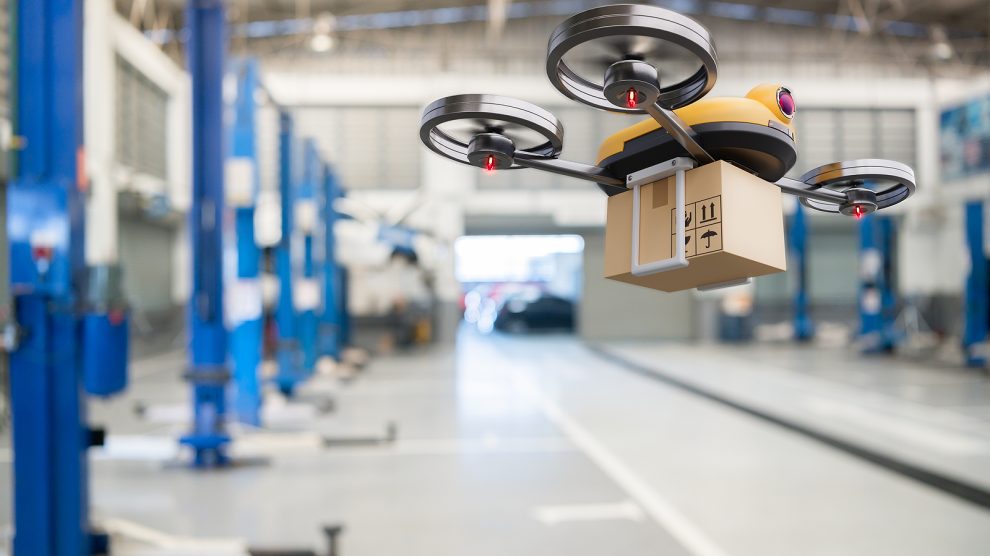Firms should prepare for the ‘widespread adoption’ of delivery drones, with vast implications for businesses and consumers alike.
The global retail and logistics sectors are on the verge of a major shift, driven by the rapid adoption of drone deliveries, according to a new PwC report, Drone Deliveries: Taking Retail and Logistics to New Heights.
The report suggests that approximately 14,000 daily drone deliveries are set to result in five million business-to-consumer (B2C) shipments in 2024. That number has the potential to soar to 808 million by 2034, reflecting the exponential growth potential of the technology.
- Time for investors to take a closer look at the digital transformation in CEE
- Why Romania should be the logistics hub for Ukraine’s reconstruction
- Once considered peripheral, CEE has become integral to the EU’s economic wellbeing
This evolution promises to drastically reduce costs, enhance service delivery in hard-to-reach areas, and disrupt traditional supply chain models, with vast implications for businesses and consumers alike.
The service available market (SAM) value of goods delivered via drones—251 million US dollars in 2024—could rise to a staggering 65.2 billion US dollars in 2034. Total market potential (TAM) is 389 billion deliveries worldwide in 2034.
As Aleksander Buczkowski, director of PwC Drone Powered Solutions, notes, “We are on the verge of an integrated drone delivery ecosystem that will transform retail and logistics last-mile delivery markets.”
Buczkowski advocates drone delivery integration in various sectors, “where retail chains, logistics companies, restaurant chains, etc., can create new sales channels, reach additional clients, enhance last-mile delivery efficiency and lower capital expenditure when expanding their businesses.”
With unit economics suggesting that delivery costs could fall to as low as two US dollars per unit by 2034, drones offer a compelling alternative to traditional last-mile delivery, particularly in suburban and rural areas.
Prepare for widespread adoption
By 2034, PwC projects that drone delivery will reach approximately 67 per cent of the global population, helping businesses penetrate underserved regions, enhance customer satisfaction, and boost profitability.
The report highlights that as costs decline by 70 per cent over the next decade, drone deliveries will become more economically viable than conventional methods, prompting widespread adoption across sectors.
Businesses are already exploring the technology’s potential, driven by both the cost savings and the chance to deliver faster, more efficiently, and sustainably.
Alongside the report, PwC introduces the new tool PwC Drone Delivery Location Finder, a geospatial analysis tool designed to identify optimal drone delivery locations.
By analysing multiple variables related to regulations, operations, drone platforms, environment and physiognomy, local market and population, as well as other parameters, the platform provides valuable insights into the potential for drone delivery across different sites, regardless of their location.
“Drone delivery plays a critical role for businesses focused on last-mile logistics. Beyond improving operational efficiency, it acts as a key differentiator, positioning them as industry leaders in an ever-changing market,” adds Mieczyslaw Gonta, partner, retail, consumer and industrial products leader, PwC CEE.
Understanding demand
The choice of goods significantly influences the drone delivery strategy, especially the drone platform and supporting infrastructure. Food and medicine may require temperature-controlled compartments, while parcels and groceries may need larger cargo spaces.
Moreover, understanding the demand for rapid delivery services of specific types of goods, in a given area is critical.
“Despite challenges, the opportunities for companies embracing drone delivery technology are immense,” says Sabine Durand-Hayes, partner, consumer markets global leader, PwC France.
“It offers eco-conscious consumers environmental benefits, value-conscious consumers cost-efficiency, and innovation-driven consumers cutting-edge experiences.”
Unlike many news and information platforms, Emerging Europe is free to read, and always will be. There is no paywall here. We are independent, not affiliated with nor representing any political party or business organisation. We want the very best for emerging Europe, nothing more, nothing less. Your support will help us continue to spread the word about this amazing region.
You can contribute here. Thank you.


